Illustration by ALEX FINE,/font>
 BY JONATHAN VALANIA Famed criminal defense lawyer, retired Harvard Law School professor and cable news gadfly Alan Dershowitz will be at the National Constitution Center tomorrow to debate the legality and ethics of drone strikes on American citizens. In advance of tomorrow’s debate, we got Mr. Dershowitz on the horn. DISCUSSED: When it’s OK for the President of the United States to order the assassination of an American citizen; his theory of a “Continuum Of Civilianality; why he is advocating for the court-supervised use of torture in so-called ticking time bomb situations; Zionism and how to resolved the Israeli-Palestinian crisis; is Edward Snowden a hero or villain; is mass surveillance of all American citizens constitutional under the Fourth Amendment; is O.J. Simpson innocent or guilty?
BY JONATHAN VALANIA Famed criminal defense lawyer, retired Harvard Law School professor and cable news gadfly Alan Dershowitz will be at the National Constitution Center tomorrow to debate the legality and ethics of drone strikes on American citizens. In advance of tomorrow’s debate, we got Mr. Dershowitz on the horn. DISCUSSED: When it’s OK for the President of the United States to order the assassination of an American citizen; his theory of a “Continuum Of Civilianality; why he is advocating for the court-supervised use of torture in so-called ticking time bomb situations; Zionism and how to resolved the Israeli-Palestinian crisis; is Edward Snowden a hero or villain; is mass surveillance of all American citizens constitutional under the Fourth Amendment; is O.J. Simpson innocent or guilty?
PHAWKER: Tomorrow, you’ll be at the National Constitution Center for the Intelligence Squared Debate. You’ll be arguing that President Obama was within the legal limits of executive power when he ordered the fatal 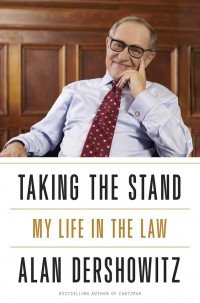 drone strike on New Mexico-born Jihadist rabble-rouser Anwar al-Awlaki in Yemen. You will argue that the President can order the assassination of an American citizen absent any due process if he’s suspected of aiding and abetting the terrorists abroad in the killing of Americans. Can you summarize your argument for us?
drone strike on New Mexico-born Jihadist rabble-rouser Anwar al-Awlaki in Yemen. You will argue that the President can order the assassination of an American citizen absent any due process if he’s suspected of aiding and abetting the terrorists abroad in the killing of Americans. Can you summarize your argument for us?
ALAN DERSHOWITZ: Yes. I think that both international law and American constitutional law simply requires that the President determine under his war-power authority that the person targeted is a legitimate combatant, not a civilian. That’s the important line – the line is between combatant and non-combatant. It’s a very difficult line to draw these days. In the old days, it was easy. Combatants wore uniforms. They’d bear arms. They were part of a hierarchical organization with insignias. Today, combatants are terrorists who work during the day in other jobs, and at night, they plant bombs – roadside bombs – or send rockets, engage in other military activities. The executive has the power to make that determination as to who’s a combatant. Once a decision that a person is a legitimate combatant he becomes a legitimate military target, and we don’t have to check to see what passport he may have in his pocket, where he was born, or what citizenship he holds. Once he’s determined to be a combatant, it’s a fair target for military activity.
PHAWKER: Can you explain this concept of a “continuum of civilianality?”
ALAN DERSHOWITZ: Yeah, it’s a phrase that I coined, and it’s not the most elegant phrase in the world. But, it actually describes what’s going on today. And that is, the line between a civilian and a combatant is not what it used to be – it’s not sharp and clear. Today you have people who are clearly combatants, that is people who are actually firing the rockets. I don’t think anybody would dispute that a member of Al Qaeda or Hamas or Hezbollah who’s firing a rocket at civilians is a combatant. The next part is, what about the person whose home has been given to the combatant from which to fire the rocket – is he a combatant? What about the person who gave money to buy the rockets that are used – is he a combatant? And I think we go down a continuum of civilianality and at some point, the person stops being a combatant and becomes a civilian. These are very important decisions. The only court I know of that has actually looked at this issue in great detail was the Israeli Supreme Court that used a very, very conservative – conservative in the sense, very protective of civilians – conservative definition of what is a combatant. And a combatant is somebody who is actually in the process – active process – of waging war, not somebody who passively supports or contributes to combatant organizations. But this is a very, very tough decision. The question is really, who makes it?
PHAWKER: So two weeks after Anwar al-Awlaki was assassinated, his 16-year-old son — who, like his father, was an American citizen — was also killed in a drone strike in Yemen. How does he figure into everything we just discussed?
ALAN DERSHOWITZ: Well, that’s a tragedy, and it shouldn’t have happened. But you know, every time the military take actions, again by drones, let’s assume that the military is bombing a military target, a clear military target, civilians may be killed in the process. The obligation under international law is to minimize civilian casualties. And to operate under a rule of proportionality, to know there might be civilian casualties. The military objective has to be very serious before you can take action; what you realize might cause civilian casualties. But civilian casualties are an inevitable part of any military activity. There used to be a time when battlefields used to be called battlefields because they were literally roped off and marked off, and if you entered onto the battlefield you were a combatant; if you were off the battlefield, there was no legitimate basis for killing you. That’s not the case today. Obviously the United States killed many, many noncombatants when it [dropped atomic bombs on] Hiroshima and Nagasaki, and firebombed Tokyo, and the fire-bombings, many of the German targets during the second World War. So civilian casualties are inevitable, and we should do everything in our power to reduce their incidence. There’s no basis for that, but I don’t think anybody claims that the United States deliberately targeted a civilian in that instance.
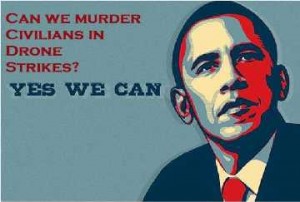 PHAWKER: Two weeks ago in the New York Times, it was reported that the Obama administration is again debating whether to authorize a lethal strike against an American citizen. This time, an American living in Pakistan, who some believe is actively plotting terrorist attacks. How does that play into what we’ve discussed?
PHAWKER: Two weeks ago in the New York Times, it was reported that the Obama administration is again debating whether to authorize a lethal strike against an American citizen. This time, an American living in Pakistan, who some believe is actively plotting terrorist attacks. How does that play into what we’ve discussed?
ALAN DERSHOWITZ: Well he’s an accidental American citizen. He was arguably born in the United States, left here at a very young age, it’s not clear that he speaks English, it’s not clear that he does not regard himself as an American, but he’s technically an American. If he came back to the United States I guess he would be eligible to run for president, if he did not give up his citizenship already. He has engaged in the crime of treason, if he is an American. The fact that he is an American makes this crime worse not better because a foreigner, or non-American, cannot commit treason against the United States. Only an American can commit treason against the United States. But that is not the issue because he cannot be caught. If he were caught he could be arrested and put on trial and the constitutional rules regarding a treason trial would be in operation and he would either be acquitted or convicted and it’d be a hung jury. But he is out of the reach of the United States and so the alternatives are not arrest or put him out of commission. The alternatives are either put him out of commission, and the only way to do that is through a drone attack, or let him continue in his activities against the United States. Given that choice, the president certainly has the power to determine the national interest of the United States requires that he no longer be able to operate against the United States. If that means killing him by a drone, that’s the appropriate tactic so long as no civilians will be killed in the process.
PHAWKER: Now if we switch out ‘extraordinary rendition’ with ‘drone strike’ is the legal footing the same?
ALAN DERSHOWITZ: I don’t understand the analogy between ‘rendition’ and ‘drone strikes.’
PHAWKER: Okay, instead of killing Al-Awlaki with a drone strike, if we had sent paramilitary to parachute in and grab him and…
ALAN DERSHOWITZ: Kidnap him. Yeah we would be acting within our constitutional authority but the question is whether we would be acting within the rules of international law. That’s a harder question. And the other hard question is whether an American president is bound by international law, customary international law, obviously any American president is bound by any treaty signed by the United States. But is he also bound by customary international law which may consist of nothing more than what some academics decided should be the right approach. So these are complex and difficult questions. Look it would be better for everybody if he could be captured, myself I believe that it would have been better for the world if Osama Bin Laden been captured rather than killed. But there is absolutely no difference between Osama Bin Laden being killed the way he was killed and being killed by a drone attack. That’s a tactical decision which has no constitutional dimension to it at all. The president has the authority to decide whether to drop a bomb or to send in the seals. He did the right thing by sending in the SEALs because if he had dropped the bomb the relatives and civilians who lived in the building would have been killed, more of them. This way there were minimal civilian casualties in the killing of Osama Bin Laden. My preference would have been for him to have been captured, placed on trial, and give him all the due process safeguards but that didn’t happen.
PHAWKER: This is a little bit of a long winded question, but I just wanted to get this read into the record, so just bear with me. You have also advocated for so-called ‘torture warrants’ wherein the government in a so-called ‘ticking time bomb’ situation could get a warrant that would enable them to torture a terror suspect who might have information that would enable the government to diffuse the ticking time bomb or neutralize the threat. This legalized torture would be conducted in a humane manner causing quote ‘excruciating pain but no real lasting harm’ unquote. For example you suggest torturers should use long sterilized needles under the finger nails of a terror suspect. Is that accurate, and do you stand by that?
ALAN DERSHOWITZ: Absolutely. That is completely accurate. I am opposed to all torture under all circumstances. I am adamantly, absolutely opposed to torture. But I also realize it is happening and it will continue to 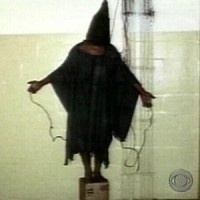 happen. And any president who is confronted with the risk of massive terrorist attacks in New York or Philadelphia or Washington in which thousands of people are killed and it could be prevented by taking a terrorist, who admits he’s a terrorist, and admits he knows where the bomb is planted but he won’t tell us, every single president one way or another would authorize whatever it took to get the information from that individual. Whether or not torture is an effective method or not is debatable. My view is that if we are going to use torture, we ought to do it with visibility and accountability. And that is why my suggestion with a torture warrant is consistent with my opposition to torture. I would rather see torture not used at all but as long as it is going to be used, and I believe it is going to be used, I want to see it used only with accountability and visibility so that in a democracy the public can ultimately decide if this is something that we will tolerate. My hope would be that if we had to issue warrants the public would be so insistent that we abolish torture that we might ultimately do so. The ‘ticking time bomb’ situation will always present the conflict between the safety of many, many, many civilians and whether or not a person should be tortured to get the information. It’s a difficult debate but I am glad I started the debate and I understand there are reasonable positions on both sides. But I am proud of having begun this debate, something that most academics refuse to debate because having any association with the concept of torture could be career ending to many academics.
happen. And any president who is confronted with the risk of massive terrorist attacks in New York or Philadelphia or Washington in which thousands of people are killed and it could be prevented by taking a terrorist, who admits he’s a terrorist, and admits he knows where the bomb is planted but he won’t tell us, every single president one way or another would authorize whatever it took to get the information from that individual. Whether or not torture is an effective method or not is debatable. My view is that if we are going to use torture, we ought to do it with visibility and accountability. And that is why my suggestion with a torture warrant is consistent with my opposition to torture. I would rather see torture not used at all but as long as it is going to be used, and I believe it is going to be used, I want to see it used only with accountability and visibility so that in a democracy the public can ultimately decide if this is something that we will tolerate. My hope would be that if we had to issue warrants the public would be so insistent that we abolish torture that we might ultimately do so. The ‘ticking time bomb’ situation will always present the conflict between the safety of many, many, many civilians and whether or not a person should be tortured to get the information. It’s a difficult debate but I am glad I started the debate and I understand there are reasonable positions on both sides. But I am proud of having begun this debate, something that most academics refuse to debate because having any association with the concept of torture could be career ending to many academics.
PHAWKER: What do you say to people who would say the ‘ticking time bomb’ scenario is just a paranoid Dick Cheney fantasia, a mirage, a viable hero action movie plot twist perhaps, but not really applicable to the non-fiction world in which we live in.
ALAN DERSHOWITZ: Well I would tell them that the ticking situation is real. Speak to the various heads of the Shin Bet and the Mossad and learn that in fact there have been several ticking bomb situations in Israel, several of which have been prevented. Mostly not by extraordinary means, but some by extraordinary means. The one thing I hate about some absolutists is their absolute denials. First, they deny there is such thing as a ticking time bomb situation. Of course, we hope there will not be one, but it is not a paranoid fantasy. Second, the absurd notion that torture never works. Of course torture sometimes works. We know that during the Second World War some of the bravest people in the world in the French Resistance were tortured into disclosing the location of their own brothers and sisters and some of their closest friends. Tragically torture does sometimes work. You never believe what a person says when he is under torture, people lie all the time, but people who torture never accept what a person says is true or false they say ‘take me to the bomb, take me to the hideout.’ It’s self-proving. It either is true or isn’t true, it’s self-proving. So yes torture does work sometimes, yes there are going to be ticking bomb situations, but no I still don’t approve of torture. But yes torture will continue to be practiced because a majority of the people all over the world will prefer to see a terrorist tortured than their friends or relatives be subjected to a terrorist attack. So as long as torture continues, we should have torture warrants and have accountability and visibility to make sure that it’s use is minimized and hopefully abolished.
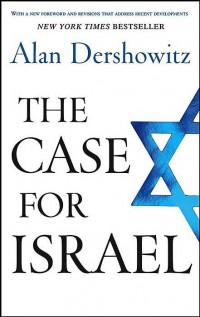 PHAWKER: You mentioned Israel, some characterize you as a ‘hard line Zionist.’ I don’t want to gI don’t want to go too far down the rabbit hole on this…
PHAWKER: You mentioned Israel, some characterize you as a ‘hard line Zionist.’ I don’t want to gI don’t want to go too far down the rabbit hole on this…
ALAN DERSHOWITZ: I guess I am. If by ‘hard-line Zionist’ you mean I strongly believe in the right of the Jewish people to have a homeland side by side with the Palestinians. I am also a hard line supporter of the rights of Palestinians to have a peaceful, viable state. I am also a hard line supporter of ending the occupation and ending the settlements of Israel. So you know, if you are trying to scare me out of my position by calling me a ‘hard line Zionist’ it doesn’t work. I strongly believe in Israel’s right to exist as a nation-state of the Jewish people. If that makes me a hard line Zionist I will proudly hold that flag and unfurl it but I also believe in the right of the Palestinian people to have a state, so long as the state is non-violent and non-aggressive. I also believe in the end of the settlements and end of the occupation consistent with Israel’s security needs. So call me what you want, those are my positions and have been my positions since the 1960s, and I am proud and stand by those positions.
PHAWKER: Fair enough, but if you could wave a magic wand and make it so, how would you resolve the Israeli and Palestinian crisis?
ALAN DERSHOWITZ: I would have a two-state solution, whereby Israel maintains control over the suburbs of Jerusalem, maintains some military presence in the Jordan valley, either through its own troops or some international troops. Also a Palestinian state on the West Bank if the Palestinians could get the Hamas in Gaza to give up their claim that they have the right to destroy Israel and a right to do it violently. Then perhaps Gaza could be included in a Palestinian state and if not then let there be a Palestinian state on the West Bank. I think the outlines of what a two-state solution would look like are fairly clear and what’s needed is the will and determination to do it. Now the greatest barrier to peace today is, or one of the greatest barriers, is the BDS movement. To boycott the best sanction movement encourages the Palestinians not to accept a compromise to peace thinking they will do better if the BDS [Boycott, Divestment and Sanctions] movement succeeds. It gets the Israelis to put their back against the wall. So if there was one single act that I could enable with a magic wand to increase the possibility of peace in the Middle East would be to end the BDS movement against Israel. That is an absolute barrier to peace and those who think it will bring about peace are dead wrong.
PHAWKER: Edward Snowden, hero or villain?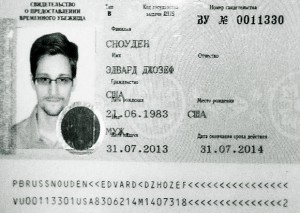
ALAN DERSHOWITZ: Both. He’s a hero if you look at what he revealed and how it’s gonna affect American policy, but he committed a crime. I wouldn’t call him a villain but I would call him a civil disobedient and he ought to come back to America and face the consequences and stand up and proclaim what he did and why he did it just as other heroic civil disobedients have done throughout history. So for me it’s a mixed picture.
PHAWKER: Bradley Manning faced the music, do you think that Bradley Manning got fair treatment — three years of pre-trial solitary confinement?
ALAN DERSHOWITZ: I think he got treated unfairly. I think his sentence is disproportionate to what he did. I also think the main fault for what Manning did lies with the United States government — and for Snowden too. Why do we let people like Snowden and Manning have access to such incredibly secret information? We classify everything, we classify things that shouldn’t be classified, and then we give people like the two of them access to unlimited amounts of information which they are then free to disclose at the detriment of the United States. I think the lesson here is to not only have fewer secrets but guard them better.
PHAWKER: Stepping back to the broader question here, is total mass surveillance of all Americans at all times constitutional as per the Fourth Amendment?
ALAN DERSHOWITZ: It isn’t. I think it is constitutional to gather all the data in the world against people who are outside of the United States who are not American citizens. Here I do really distinguish between people who are American citizens and people who are not. The constitution does not protect Angela Merkel but it does protect Joe Six-Pack who may be sending communications to his girlfriend online and we now know that British intelligence has been picking up web traffic including some fairly explicit and personal pictures. And that is going way, way beyond the pale but I think one has to distinguish between policy and the constitution. The Fourth amendment only protects Americans, American citizens or American residents, it does not protect people who are heads of state of foreign countries. But it may be the wrong policy for us to be intruding on the private communications on the heads of state unless they are absolutely essential to the security of the United States.
 PHAWKER: Last question, if you had to do it all again would you still sign on to the O.J Simpson defense team?
PHAWKER: Last question, if you had to do it all again would you still sign on to the O.J Simpson defense team?
ALAN DERSHOWITZ: Of course, I was very proud of my role there. It was capital case when I first agreed to do it and we proved, I think, that the police tried to frame a man they believed was guilty by tampering with evidence. We proved that the sock that contained the blood of both the victim and defendant had EDTA in it and EDTA is not found in the human body. It is an anti-coagulant that is found in test tubes so the blood was poured from test tubes onto the sock to create a piece of evidence. Once the jury heard that, they said despite the mountain of evidence they could not trust the mountain because if one piece of evidence was manufactured or tampered with by the prosecution and police how do we know that the rest of the evidence wasn’t tampered with. So of course I am proud of my role in the O.J Simpson case and of course I would do it again. That is my job to defend people charged with the most serious of crimes. I have had 37 homicide cases and I describe them all in my new book Taking A Stand: My life And The Law I have won the vast majority of them by using science. Simply by using science and bringing out the truth. If you don’t like criminal defense lawyers like me think of what the country would be like without any criminal defense lawyers. You don’t have to think about it, just take a look Iran where they hang people in the street without any charges or any semblance of a trial. The fact that we have due process in America is very important and I am glad to have played a role in it.
PHAWKER: Outside of the specifics of the trial, or any of the actions alleged or otherwise of the Los Angeles police department, do you think O.J Simpson is innocent of the murders of Nicole Simpson and Ron Goldman?
ALAN DERSHOWITZ: I will answer that the way I answered it in my book. One day Benjamin Netanyahu who had just been elected prime minister of Israel at the time, called me into his office and he said he had a very, very secret question to ask me. I thought he was going to ask me about Iran’s nuclear policies, and he takes me into the office and he says ‘Allen, did O.J do it?’ and I said ‘Mr. Prime Minister, does Israel have nuclear weapons?’ He said ‘Al you know I can’t tell you that!’ and I said ‘A-Ha! You know I can’t tell you that!’ So we both have things we have to keep to ourselves, and my personal views on the guilt or innocence of a client is not something that legal ethics permits me to share to the public.

